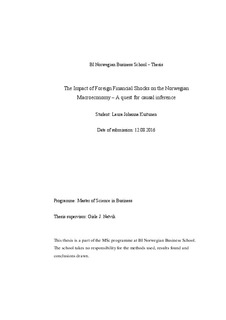| dc.description.abstract | In this master thesis, I evaluate empirically the importance of foreign financial shocks for explaining business cycle fluctuations and monetary policy stance in Norway. These shocks are a U.S. monetary policy shock and a U.S. based financial uncertainty shock, which in some of the literature are taken to represent the global financial cycle. To this end, I construct a set of structural VAR models, some of them identified recursively, some identified outside the model resorting to the literature of high-frequency identification of monetary policy shocks. The Norwegian responses of interest are in the GDP or industrial production index, inflation, interbank interest rate and the exchange rate. I find that the financial uncertainty shock has a limited and non-robust capacity to impact the macroeconomic performance of the Norwegian economy, while the monetary shock has potential to evoke notable and statistically significant short-term responses. | nb_NO |
